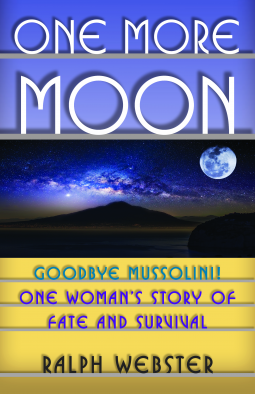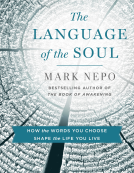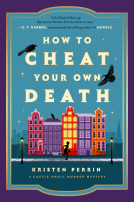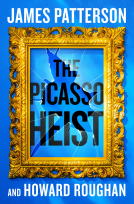
One More Moon
Goodbye Mussolini! One Woman's Story of Fate and Survival
by Ralph Webster
This title was previously available on NetGalley and is now archived.
Send NetGalley books directly to your Kindle or Kindle app
1
To read on a Kindle or Kindle app, please add kindle@netgalley.com as an approved email address to receive files in your Amazon account. Click here for step-by-step instructions.
2
Also find your Kindle email address within your Amazon account, and enter it here.
Pub Date Feb 28 2018 | Archive Date Mar 08 2022
Talking about this book? Use #Onemoremoonbook #NetGalley. More hashtag tips!
Description
Goodreads Choice Nominee Ralph Webster tells the true story of his grandmother’s desperate journey from her life at the Pensione Alexandra in Naples to America - after Mussolini and the Fascists join with Hitler - and as countries across the world close their doors to Jewish refugees fleeing the spread of Nazi evil.
In 1934, at age fifty-one, Elsa’s comfortable life in Mussolini’s Fascist Italy changes remarkably when she and her husband, Paul, purchase the Pensione Alexandria overlooking the Mediterranean in Naples. Though German Jews, they are embraced by their Italian neighbors, and for the next several years, the pensione flourishes and becomes their perch to observe the world’s events. Travelers from across Europe and America come to their door, each with their own story, mystery, or surprise. Nearly all have been touched in some way by the ominous changes occurring to the north, in Nazi-controlled Germany.
When war breaks out in Europe and Italy sides with Germany, Elsa and her family’s fears are quickly realized. The growing sense that the atrocities in German-occupied lands will soon occur in Italy forces them to sell their pensione and attempt a desperate journey to safety in America. The way seems impossible. Day by day, war makes travel increasingly difficult as countries begin closing their doors to refugees.
Told in Elsa’s words and written by her grandson, One More Moon is the extraordinary story of a woman and her family’s often harrowing experiences in the years before and during World War II.A Note From the Publisher
Please contact Ralph to schedule via Skype or in person for your book club.
Advance Praise
One More Moon is a lovely memoir that was a delight to read. It’s everything that an Indie book should be. It’s written by a skilled author with a smoothly flowing style. It has a strong story-line that held my attention from start to finish. And it has obviously been very carefully edited. Denzil The BookOwl January 24, 2018
A lovely follow up book to "Smile in One Eye...", "One More Moon" chronicles the impact of global war on individuals, families, and society as a variety of characters traverse through a Pensione (hotel) in Italy. Told from different generational views this book is warm, engaging, and clever; quickly engaging the reader and spotlighting the individual humanity so often overlooked within global strife. "One More Moon" is a masterpiece of personal storytelling which leads to a deeply engaging ending that is simultaneously bittersweet and heartwarming. Michael PattersonMarketing Plan
Ralph welcomes the opportunity to do interviews.
Whenever possible he is available to participate in book club discussions via Skype.
Ralph welcomes the opportunity to do interviews.
Whenever possible he is available to participate in book club discussions via Skype.
Available Editions
| ISBN | 9781979461658 |
| PRICE | |
Average rating from 18 members
Featured Reviews
 Gabriela Z, Reviewer
Gabriela Z, Reviewer
One More Moon has a great opening that gets you hooked for at least half the book because you really want to know what happened. This is a great memoir that helps understand what German Jews went through in search of a new beginning outside Europe. It was really interesting to learn about Elsa's journey to America, and how difficult it was to travel from Italy to the United States in times of war. The stories that took place on Pensione Alexandra were also fascinating. A great memoir book, written by her grandson.
 Connie B, Reviewer
Connie B, Reviewer
While I enjoy memoirs, I wasn’t expecting very much from this book because of the cover; it didn’t look very interesting to me. Was I ever wrong!
I loved so much about this book, especially the conversational style that it was written in. Reading it was almost like sitting with an elderly woman who has had a lifetime of interesting adventures to share. Elsa talks about what it was like to be born into a well-to-do German family where servants take care of the chores. She does not come across as someone who felt she was better than others; her status was simply the only way of life she had ever known. After her parents send her to Naples to visit relatives, she falls in love with Paul the man that her family had carefully planned for her to meet. She becomes Paul’s wife and continues to live as a well-taken care of woman who has household help to do most of the chores. After some financial setbacks, the family has to let the help go.
From that point on, Elsa's life expands as she decides, with her husband’s agreement, to buy a Pensione (hotel). Elsa now has many jobs which she was unprepared for, but she steps up to the challenge. As Jews in Italy, her family and also the extended family members residing in Germany are all affected by Hitler’s rise to power. She shares what it was like to live during those years, and how they eventually got away, but not before helping many people in need by letting them stay in her hotel.
This book was a treasure trove of historical events, shared by a person who lived through them, told in such an engaging voice that I kept reading it every chance I had. Elsa added interesting tidbits about some of the guests who stayed in the hotel that really added to the book. I highly recommend it.
Loved learning more about what life was like in Italy during World War 2 for German Jews living in Italy. Love that this book is a different book from the typical Holocaust story. I can appreciate those about the camps but it is nice to read something else for a change. I liked that there was not a lot of viuolence. There were some suspenseful moments, but they were good. Parts seemed a bit rambly but can be overlooked. This explains a lot about why people did not leave during these rough times. I appreciated the perspective of being a German, Jew, and Italian.
 Bambi R, Reviewer
Bambi R, Reviewer
First I will thank Bookish for the opportunity to read this story. It's a memoire of a Jewish German woman, Elsa as she leaves Germany to go to Italy in the early Nazi uprising years. It's the story of what life was like for her and her husband, Paul, in Italy and making Italy their home. Then Hitler starts his domination and Elsa and Paul feel they need to flee the country and try to get to America where their children have gone before them. The story does get repetitive and somewhat dragging but there are a couple of lines that make this a memoire to pass on as it's based on the author's grandmother's story. The first line I liked was her saying, "The next generations have their lives to live, and my only advice is: the sooner they begin the better. It is all right to be a little selfish. From my perspective, the good years should be enjoyed. Life passes in the blink of an eye." The experiences Elsa and Paul went through to live a life were sometimes very trying and scary...other times very peaceful and content. The other quote I liked was the end of the book. She would relate life as moving from a dot-to-dot creating a picture of her life. "Fate has a way of connecting the dots, an invisible hand that guides from one to the next, sometimes gently, sometimes forcibly, but always watching, always there. I have always prayed for the invisible hand. Fate is what connected me to you." This was a nice story and had a perspective of world events that was worth the read.
 Marialyce W, Reviewer
Marialyce W, Reviewer
3.5 interesting stars
Elsa and Paul have, when they were in their fifties, decided to buy a pensione in Naples. The year was 1931 right before the war years would set in. Elsa and Paul were German Jews who eventually became Italian citizens. The story of life in Italy at the time of the rule of Mussolini is told in this book written by their grandson. He uses Elsa's words to tell of the times that people were going through with the rise of Hitler and the hatred that seemed to spread across Europe for the Jews.
This was a tale of adventure, of meeting people through the pensione, of eventually being able to come to America after many harrowing experiences. Living in Fascist Italy, Elsa and her family see the changes coming and once Hitler comes to power those changes did not bode well for Elsa, Paul, and their children. The children were able to come to America, but the road for Elsa and Paul to do so, was fraught with many difficulties.
Through all of this Else remembers and cherished the people and friends she and Paul made while owning the pensione. Her Italian neighbors embraced them, but of course the writing was on the wall where Jews were concerned as Mussolini aligned his country to Hitler and the war.
Ralph Webster has told a loving stoy of his grandmother and the trials and joys she lived through. Elsa embraced her life, loved her husband and her children and their children and lived until the age of ninety-eight.
Tank you to the author, the publisher, and NetGalley for providing this reader with a moving story of love and resilience.
 Tami D, Reviewer
Tami D, Reviewer
Imagine yourself sitting down with an elderly woman and listening as she tells you her life story. This is what Ralph Webster brings to readers as he recounts a beloved family member’s experience during WWII.
This is not your typical Holocaust story. There are no camp experiences--no violence of any kind. There are some nail-biting moments, however. Webster presents a view of the war that is a bit different.
Elsa and Paul are German Jews who had immigrated to Naples, Italy as young adults. They married and raised a family there. When the children were grown, Elsa and Paul decided to buy a small hotel and the experience brings out another side to Elsa.
There are a few interesting stories about the guests at the hotel and about how the clientele changed as World War II started. Once Italy entered the war, Elsa and Paul and their children realized they needed to get to America. Easier said than done!
I had always wondered why people didn’t leave sooner or leave at all, and through Elsa’s account, many of the reasons are explained. I appreciated her perspective from being both German and Jewish and being an Italian citizen during the time that Mussolini entered the war.
The book had some passages that were redundant and rambling, but I can forgive that seeing as it’s told from the voice of an elderly woman. Still, a bit of editing would have moved the story along and helped to keep readers engaged. I loved how the story came full circle and resolved some mysteries about Elsa’s friends.
Many thanks to NetGalley and CreateSpace for allowing me to read an advance copy. I am happy to give my honest review.
 Reviewer 223873
Reviewer 223873
This is one of those books impossible to slap a marketing tag onto, as it's fiction . . . but not really.
Webster has chosen to tell his grandmother's story through first person, until the very end. The narrative drive (I am avoiding the word novel) not only has an authentic feel, as if he's heard the story many times, but there's authenticity in the way many elders (the grandmother is ninety eight when she is purportedly writing, or telling, this history) wander from point to point, often repeating themselves.
The book also demonstrates, at least for me, the difference between an editor and a copyeditor. Unlike many indie publications, for which most writers can't afford professional copyediting, this book had no spelling or grammatical errors that I could see. However, a professional editor might have reined in the constant repetition not only of opinions but on the sentence by sentence level: repeatedly, sentences say the same thing in different words, usually generic expressions.
That said, there is a compelling draw to the story overall, in which Mamarella, as she was called by her offspring, a Jew born and raised in Koenigsberg, Germany, ended up in Naples, sent by her aunt to be married off to Paul, who was also born Jewish, though his family had assimilated. Mamarella ends up at the age of fifty buying a pensione, and running it as a Neapolitan until WW II's insidious reach dispersed Italy's Jews ahead of the Nazi death brigades.
Then she and Paul must leave Naples after forty years of happy life. They eventually get to America, arriving after their three adult kids.
The first half of the book meanders back and forth from the Florida rest home in which Mamarella spends her last years to her early years, her marriage, her opinions on Mussolini and life in Italy under his rule, thence to the pensione and some of the characters she knew in Naples.
The first warning sign of trouble to come was the overnight rejection of the pair from the local German club, of which they had been members for years. They'd taken part in activities, sharing events with other families who they considered friends. One night they arrived to discover that Jews were no longer welcome--a reflection of what was beginning to happen in Germany.
Despite an opening that seems to promise a very different kind of book, in which two young women plunge from an airplane to their deaths, there is not a lot of drama. What you get is a very realistic depiction of the bewilderment and anxiety of ordinary people who find their homes, their jobs, and then their lives, threatened because of venal politicians far away. In that sense, this book is a pertinent read for today.
We eventually find out about the two young women, though they are never really brought to life. Other than brief, delightful moments with some of the Neapolitans, I didn't find any of the other characters coming to life, specifically the couple who take up a great deal of space through the book, Josef the painter-doctor and Kaethe, his young wife with the long, graceful neck. We are told, not shown, repeatedly (I lost count at six, but there were more) long descriptions of the fact that these two had 32 years between them, and that they had secrets that Mamarella didn't know, even though she claims to have had an intense friendship. She tries to imagine what those secrets were, which doesn't add much to character, then we get yet another long repetition of their secretive natures, and those 32 years between Josef and his young wife with the long, graceful neck.
In spite of the fact that I think a better editor was needed to trim a lot of the repetition and maybe try to draw out some details that would better bring incidents and people to life (her children are mere names, for example), and trim the ending, which is a morass of repetitive detail and a closing disclosure that had no impact, the overall effect of the book was absorbing, with the resonance of experience.
I wonder if the nature of this tension between respecting the verity of his grandmother's real life and the demands of fiction hamstrung the author, keeping him from offering scenes in which the reader could immerse, instead of yet another repetition of opinion and surmise and philosophizing? How does one make art of quiet lives during world-shaking events?
Anyway, though it was rather a slow read, it was still absorbing, demonstrating one of the many ways family lore can be retained when those who lived the experiences are no longer with us.
 Reviewer 238609
Reviewer 238609
I loved this story of a woman who lived under Mussolini. It was a captivating read.
 Bonnye Reed F, Reviewer
Bonnye Reed F, Reviewer
Ralph Webster brings us a biography of his grandmother, a Jewess raised in Koenigsberg, East Prussia, Germany on the Baltic Sea. Elsa moved to Italy as a young lady in 1905, met and married her husband Paul, and raised her four children in Naples. In 1935, the industrial nations clamped hard in a global depression and war rumors whispered around the world, Paul's second generation business of obtaining and selling tartar from wine makers to make the leavening agent known as cream of tartar began to fail as money grew tighter in Europe and America. Elsa, with the encouragement of her youngest child, teenaged daughter Mela, invested in Pensione Alexandra, a guest house overlooking the Bay of Naples at Caracciolo 13. And despite their combined better judgements, Pensione Alexandra suited Paul, Elsa and Mela well.
But in September 1939 Germany invaded Poland. Britain and France declared war on Hitler, and Italy's dictator Benito Mussolini chose to back Germany in this conflict which became known as World War II. Jews of any stamp were now not safe anywhere in Italy.
The best explanation I have heard for the rapid and complete rise of Hitler and Natzism in Germany is on page 194 of this biography, a quote taken from a speech by Jewish Doktor Josef Samson. "If you fill a room with 100 people from Germany only one will be a Jew. That is how small the number of Jews are in Germany. Most Germans have never met a Jew. All most Germans know about Jews is what they have been told. Most Germans have no Jewish friends. The Jews in Germany have kept themselves apart and been kept apart. You ask: who are the supporters of Hitler and the Nazis? You are asking the wrong questions. You should be asking: who in Germany supports the Jews? Who are their defenders?"
Mr. Webster uses photos and his grandmother's journals, notes and lists for the root of this story, but he was blessed to have access to his grandmother, as well, to hear her memories and flesh out her life story, as she waited for her 100th birthday in a care facility in Portland, Oregon. What a great story. What an incredible journey. What a lucky man is Ralph Webster! I am so sorry for your loss.
I received a free electronic copy of this very interesting history from Goodreads, Ralph Webster, and CreateSpace Independent Publishing Platform in exchange for an honest review. Thank you all for sharing your hard work with me.
Readers who liked this book also liked:
Silvia Moreno-Garcia
Historical Fiction, Literary Fiction, Sci Fi & Fantasy


















